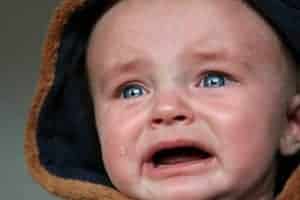
Feeling afraid of your newborn baby crying after feeding? Don’t be. Crying after feeding is a very common phenomenon of a newborn baby. And, normally, it continues for just a couple of days. Being a mother of two lovely children, I know the fact from my personal experience.
When my baby used to crying after feeding I used to be anxious at the first time. Then I consulted with my relatives and neighbors who were experienced about the matter. However, I overcame the problem snugly. Even, during my second child, I tackled the situation fairly. Below I have pointed out some common facts that are the culprit of crying baby after the feeding.
10 Most Common Reasons for Baby Crying After Feeding
Crying after breastfeeding of a newborn baby can be break into several reasons. Do you know what the reasons are? Let me tell you. A newborn baby can be crying for several reasons such as- tiredness, hungry, ailment and so on. Let’s jump over the vital points deeply.
1. Your Baby Is Exhausted:
Usually, newborn babies have two ways to get sleep after feeding. One is settled way another is an unsettled way. In a settled way, baby gets asleep after breastfeeding at once! On the other hand, in unsettling way baby sleeps little but cry a lot. If your baby is in an unsettled way then you may experience the crying journey after the breastfeeding. However, this problem might take a maximum of 3 months to resolve. Until, you should apply the cluster feeding (feeding baby with regular interval).
2. The Right Flow of Milk:
Crying after a feeding might be caused by the flow of breast milk of you. If your breast flow too quickly then after begins the flow baby might pull off your breast coughing or gagging. Again, in terms of the slow flow of breast milk baby gets impatient and rolling over his body baby start crying. To resolve this situation breast compression might help you out.
3. Baby Is Teething:
You might be seen your baby crying all day long including breastfeeding time. In this case, the baby might be teething. It refers to your baby experiencing white patch gum soreness in the mouth. Our recommendation is to visit the baby health professional to sort out this problem.
4. Baby Prefers Another Breast:
Your baby may prefer one of your breasts intuitively. This is a very common phenomenon in the newborn baby. If you see your baby is fussing after having one breast then shifts him/ her to another breast immediately else your baby might start crying.
5. Baby Is Not Willing To Feed At This Moment:
Sometimes the baby refuses to feed breast when their tummy is full enough. You may be seen, you dragging the baby’s mouth and your baby coming off the breast. In this situation, you might understand that your baby is not willing to feed right now else this unwillingness might turn into crying. Sometimes baby just wants to suck your breast not feeding milk for comfortable; let him/her do this.
6. Your Baby Has Gas:
Your baby may be suffering from the gas or wind in his/her tummy. Burp your baby while feeding or shifting from one breast to another breast. To eliminate this discomfort, you can massage your baby’s belly and place on your shoulder for a burp.
7. Your Baby Has Reflux:
If your baby suffers from reflux then crying is the indication of it. When a baby feeds sometimes the foods go back up the esophagus due to their food contents (liquid mostly) and shorter food pipe. Plus, baby always lay down on bed hence while feeding the food goes back top of the esophagus. To avoid this issue, try to do not give overfeed, burp your baby while feeding and hold for 20-30 minutes upright after feeding. You can also use a baby swing that is specially made for reflux baby.
8. If Baby’s Nose Is Blocked:
Especially in winter baby may face cold, consequently, suffer from coughing, and blockage nose. In this case, the baby does not breathe easily and sucking breast. Plus, when breastfeeding baby’s nose stick to your breast and baby feel hard to breathe consequently baby crying. In this case, position your baby more upright while feeding. Give your baby firm support behind the shoulder. Consult with baby health care provider immediately.
9. Baby Might Have A “Wonder Week”
Having a wonder week might cause of baby crying after breastfeeding. A Wonder week refers to when a baby has a leap in physical as well as mental improvement. In general, your baby is trying to brainstorm whatever learning. It might happen while your baby is crawling, rolling over, or talking. Thinking too many comparing age might hamper your baby’s normal thinking process. As a result, babies cry a lot.
10. Food Sensitivity:
It’s unprecedented for indications of nourishment affectability to happen while an infant is by and large only breastfed. In any case, a child who has sustenance affectability can be commonly more agitated than an infant without nourishment affectability.
An infant with nourishment affectability may encounter more stomach torment and wind, and this may make her fall off the bosom crying. On the off chance that you presume your child may have sustenance affectability, see a dietitian who has an enthusiasm for lactation and nourishment hypersensitivity.
Final Words
Above facts are common for the baby crying after feeding. If you see an uncommon scene then immediately contact with the baby health care provider.
